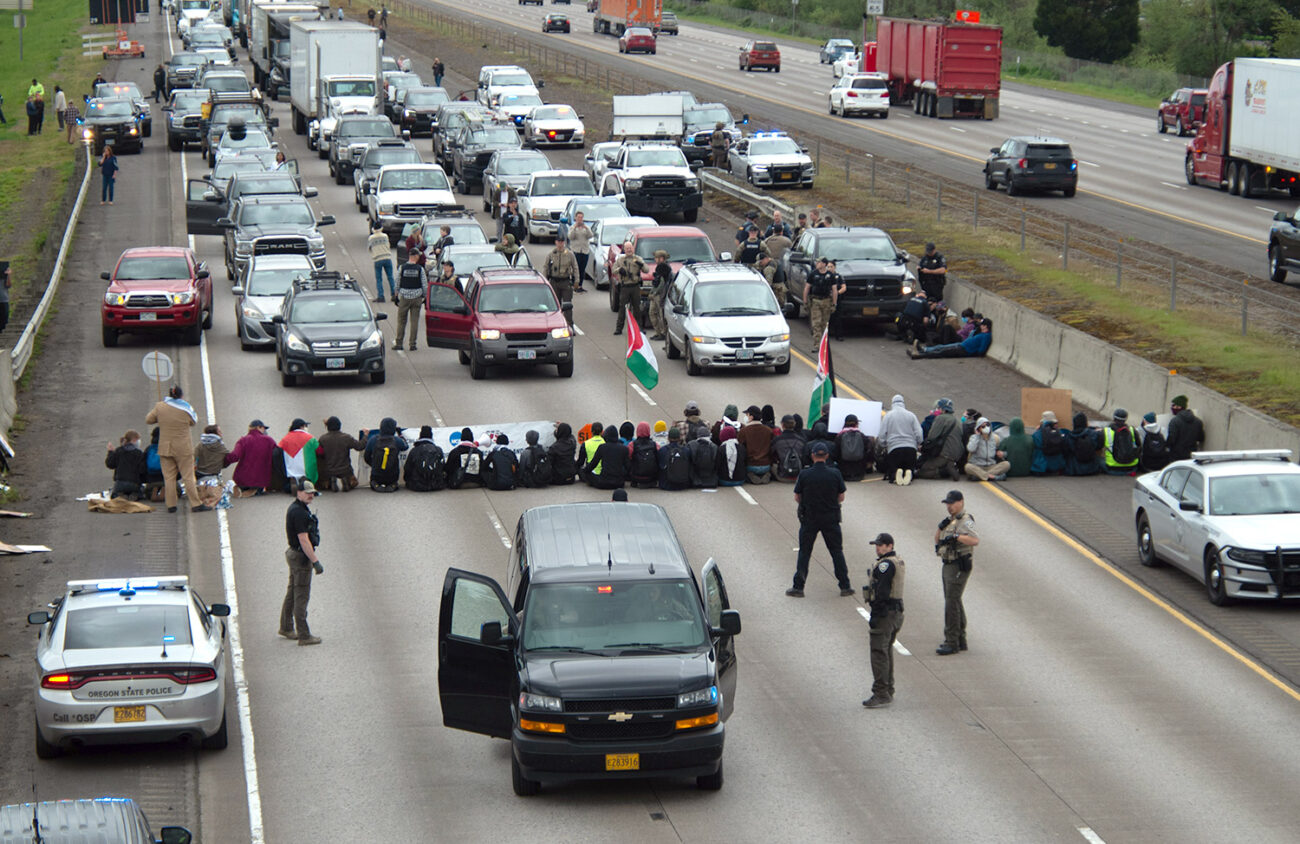By A. Rabideau
On Oct. 17, I sat before a jury of my peers and explained why six months prior I helped shut down I-5 in Springfield. I identified this highway blockade as an act of civil disobedience responding to a call to action from Palestinians. The act was coordinated with 80-plus cities around the world and executed on April 15, Tax Day (“A15”), to interrupt “business as usual” that enables the ongoing genocide of Palestinian people.
Throughout my trial, we emphasized the power of civil disobedience, drawing comparisons between this action and the 1965 Civil Rights march across the Edmund Pettus Bridge in Selma, Alabama, which taught us that blocking traffic and therefore interrupting local economies was necessary to successfully fight segregation.
When asked about their own opinions of civil disobedience during jury selection, one juror even evoked the words of John Lewis, highlighting the need for “good trouble” in a system where being well-behaved often isn’t enough to get one’s rights recognized.
My jury listened thoughtfully as I explained my horror at witnessing a genocide funded by my labor and my taxes, and my hope that this action might contribute to ending the genocide when so many other strategies have failed. After two hours of deliberation, my jury returned a guilty verdict, wincing apologetically.
Afterward, one juror even approached me for a hug, telling me all the jurors supported me and felt awful about convicting me, but felt they had no other choice.
To my jurors — if you’re out there and reading this, know that I hoped for so much more from you, not just for me, but for the reverberating impacts of your decision. You showed me you understood the significance of this moment in history, and yet you failed to rise to the occasion.
The power to convict me or acquit me was completely in your hands, and you succumbed to the pressure of the district attorney and convinced yourselves that to enforce the exact letter of the law was the “just” thing to do.
There is a long history in this country of jurors leveraging their unique positions and refusing to uphold laws that violate their conscience and understanding of justice.
In the historic contexts of fugitive slave laws and alcohol prohibition, jurors refused to convict people at such high rates that these laws became unenforceable, and local law enforcement could no longer justify the hassle and resource drain of arresting and charging people who continuously got acquitted by their peers. In this way, jurors get to exercise their judgment not just on their peers, but on the laws that govern them. I thought that my jury might also see the disorderly conduct law leveraged against my “good trouble” as repressive and unnecessary.
In his closing remarks, attorney Ryan Leal implored my jury to ignore my character, my cause and the greater context of my protest, and to uphold “law and order” and find me guilty. He demanded the jury consider a next time, in which the Proud Boys or the KKK block the I-5. He said it’s only fair that we are all treated equally under the law.
Leal’s provocation of “fairness” is hypocritical and frankly, sickening. We know that the law is not equally applied to everyone, and that the laws do not keep all of us safe even when we uphold them unquestioningly.
How has this grand institution of U.S. law and order protected my friend’s families living in Palestine and Lebanon? Where are the charges of genocide, torture and war crimes for our federal government? Where is the jury that will ask President Joe Biden to explain his repeated support for an Israeli government that has stolen land, systematically demolished hospitals, routinely murdered children, and is on course to eradicate an entire people?
How can Eugene justify spending its resources on 30 hours of jail time, two days of trial and 18 months of probation for a disorderly conduct misdemeanor charge for someone who was blocking a roadway for less than three minutes before they were dragged away in handcuffs? Make no mistake, this government has no interest in “fairness.” Its priority is maintaining business as usual to protect its financial and political interests, which sometimes includes bullying jurors into enforcing that status quo.
Finally, to my jurors, if you agreed with my cause and my actions, as I sensed that you did, I plead that next time, you consider your power, you stand firm in your convictions, and you refuse to enforce “business as usual” as the genocide rages on.
